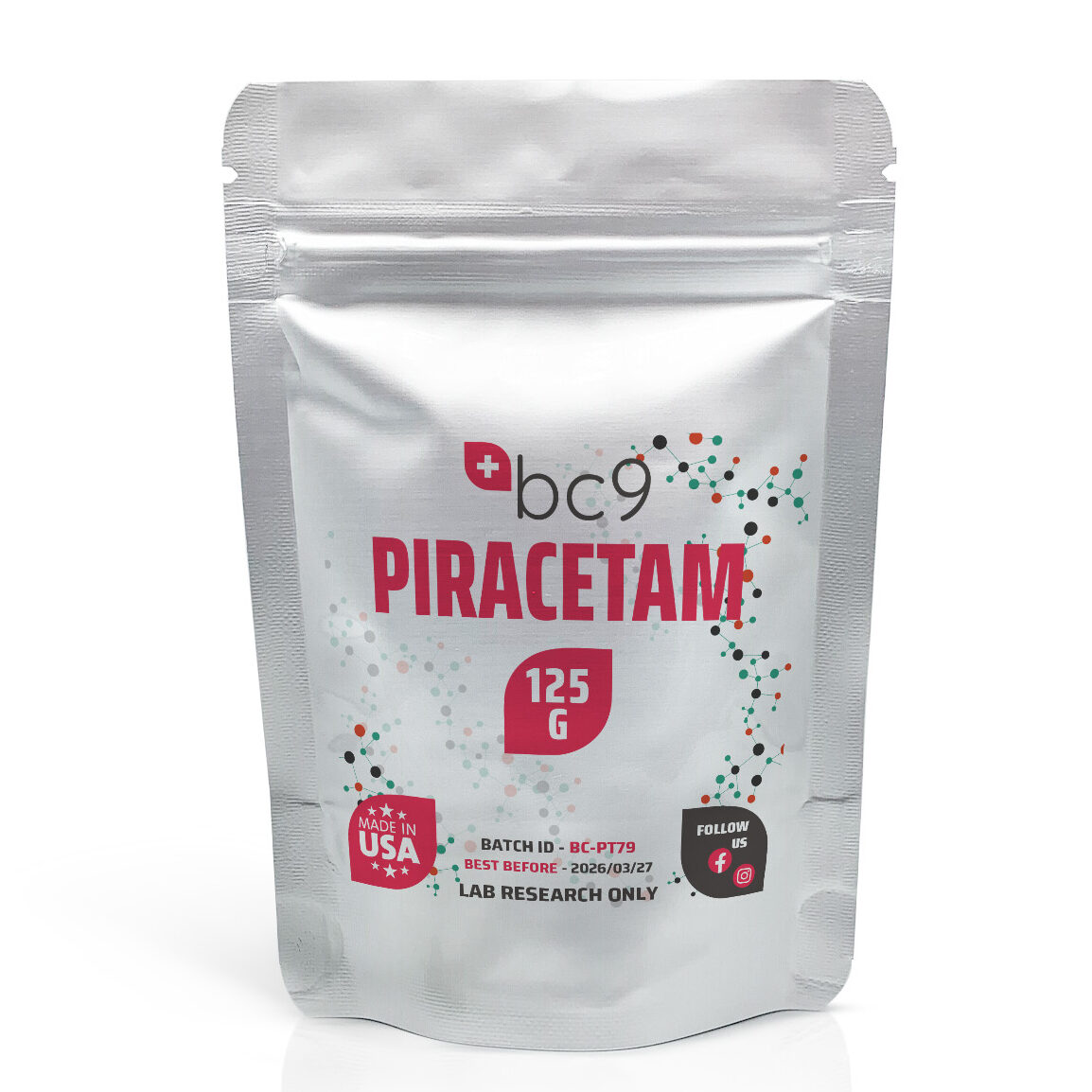Piracetam is a nootropic compound that was originally developed in 1964 by a scientist called Corneliu E. Giurgea. It has been around for a long while but has recently garnered some significant interest in the cognitive effects of piracetam. In this article, we will discuss why there is some hype regarding the potential neurocognitive effects it may bring to the table. [R]
What is Piracetam?
Piracetam is a synthetic nootropic agent that belongs to a class of compounds called racetams. It is being extensively studied for its potential to improve cognitive function and memory. Particularly as it relates to conditions such as Dementia and Alzheimer’s disease. It has also been studied to help with conditions related to muscle spasms. This makes it quite a diverse drug for study and potential future interventions. [R]
Piracetam is also known as a cyclic derivative of GABA. Gamma-aminobutyric acid (GABA) is a neurotransmitter, a chemical messenger in the brain. As a cyclic derivative of GABA, Piracetam was originally developed as a potential aid for motion sickness. However, early on it was found that Piracetam was not effective as a calming compound and does not directly affect GABA receptors. Instead, Dr. Giurgea found that Piracetam could enhance cognitive function. Interestingly even in healthy subjects.
How Does Piracetam Work?
As a result of Piracetam, many derivatives with similar mechanisms of action have been developed. These compounds work by affecting AMPA receptors. It enhances acetylcholine function in the brain of subjects.
AMPA receptors are a type of glutamate receptor. The receptor is heavily involved in synaptic transmission and plasticity. Piracetam is thought to potentially modulate these receptors. Piracetam is believed to modulate these receptors. This can improve the efficiency of synaptic communication and enhance cognitive functions. This has massive potential implications for memory and learning. [R]
Simply put, AMPA receptors are like small communication points in the brain that help brain cells communicate. Piracetam is believed to help these communication points work better.
Acetylcholine is another neurotransmitter crucial for memory and learning. Piracetam is thought to increase the activity or availability of Acetylcholine in the brain. This may support better cognitive performance.
You can discover the complete product range at BC9.org.
Potential Benefits of Piracetam
Potential Cognitive Effects of Piracetam
Research suggests Piracetam may have the potential to enhance brain function. However, more human trials are required to find the exact proven mechanism of action. Animal studies have provided researchers with some potential answers.
Animal studies indicate that Piracetam may potentially make cell membranes more fluid. If cell membranes are more fluid, it may improve its ability to send and receive signals. This can aid in communication. [R] [R]
This is a potential explanation for findings on potency in older adult subjects with mental issues. Research shows these populations have fewer fluid cell membranes. [R]
Studies observed that Piracetam has the potential to increase blood supply and oxygen in the brain. It also may enhance glucose consumption in subjects with mental impairment. This may have major applications for brain health and function. [R] [R]
One study on 104 patients with mild cognitive impairment or dementia showed some interesting results. Piracetam treatment had the potential to improve memory and psychomotor functions. These potential improvements in cognitive performance appeared after a few weeks of administration. [R]
It is valid to note that most human trials on Piracetam and brain function are fairly dated. More recent research is needed to provide a better indication of the safety and efficacy of Piracetam.
Piracetam and Mental Performance Research
In a double-blind placebo-controlled trial the effects on mental performance was investigated. The study utilized a population of 18 aging non-deteriorated subjects. Mental tasks were administered to subjects following either placebo or piracetam administration. [R]
In most of the mental tasks, subjects on Piracetam performed better than their placebo counterparts. These findings indicate that Piracetam may aid subjects with reduced mental performance.
Piracetam and Dyslexia Symptoms Studies
Dyslexia is a learning disorder characterized by difficulty reading. This may be due to problems related to identifying speech sounds and learning how this relates to words and letters. [R]
A 1987 study conducted on 225 adolescent subjects with dyslexia was conducted. After 12 weeks of Piracetam, subjects showed significant improvements. This was seen in their ability to read and understand text compared to the placebo population. [R]
Potential to Reduce Dementia and Symptoms of Alzheimer’s Disease
Dementia is characterized by a group of symptoms that affect memory, communication, and the ability to perform tasks. Alzheimer’s is thought to be the leading cause of dementia.
Research suggests that damage in the brain caused by a build-up of amyloid-beta peptides may play a key role in its development. These peptides tend to group between nerve cells and impair their function. [R]
In vitro studies show that Piracetam may have the potential to protect against dementia and Alzheimer’s. This may be due to its potential to prevent the potential damage caused by the amyloid-beta build-up. [R]
Piracetam and Myoclonic Seizures
A double-blind, crossover study suggests that Piracetam may be effective for treating myoclonus epilepsy. It also appears to be well tolerated by patients. [R]
Potential Side Effects of Piracetam
In a research context, Piracetam is considered safe with little risk of side effects. In long-term studies, doses of up to 24 grams daily have had no adverse effects on test subjects. [R]
However, long-term studies and more recent research are required before Piracetam can be deemed safe for humans. Piracetam is intended for research purposes only.
Final Thoughts
Piracetam is a synthetic nootropic drug that is believed to have the potential to improve brain and cognitive function. It seems to be an exciting future potential aid for older populations and populations with mental health issues. However, due to a lack of recent research, it is to proceed with caution and is intended for research purposes only.






